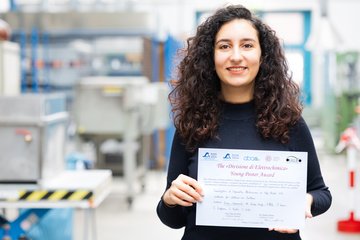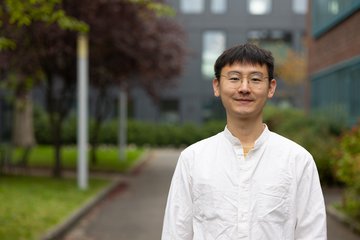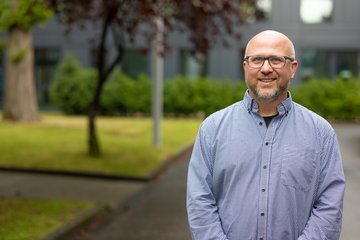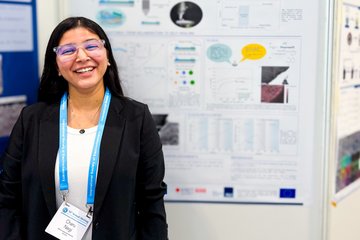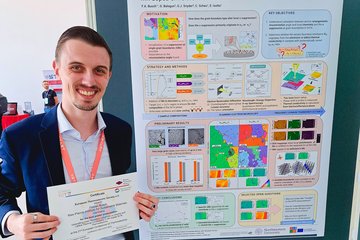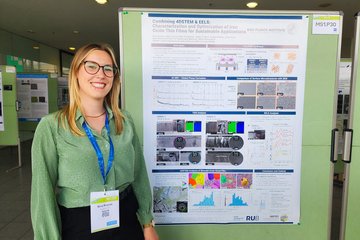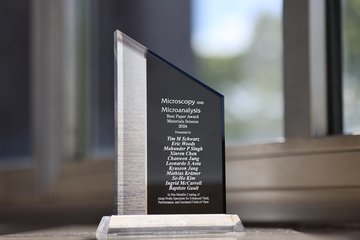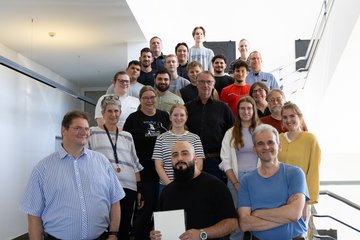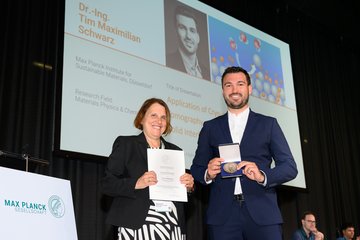Alle Typen
1.
Zeitschriftenartikel
Robustness and optimal use of design principles of arthropod exoskeletons studied by ab initio-based multiscale simulations. Journal of the Mechanical Behavior of Biomedical Materials 4, S. 129 - 145 (2011)
2.
Zeitschriftenartikel
Ab initio study of thermodynamic, structural, and elastic properties of Mg-substituted crystalline calcite. Acta Biomaterialia 6 (12), S. 4506 - 4512 (2010)
3.
Zeitschriftenartikel
Revealing the Design Principles of High-Performance Biological Composites Using Ab initio and Multiscale Simulations: The Example of Lobster Cuticle. Advanced Materials 22 (4), S. 519 - 526 (2010)
4.
Zeitschriftenartikel
Hierarchical Modeling of the Elastistic Properties of Bone at Submicron Scales: The Role of Extrafibrillar Mineralization. Biophysical Journal 94, S. 4220 - 4232 (2008)
5.
Zeitschriftenartikel
Size Dependent Hardness of Polyamide/Imide. The Open Mechanics Journal 2, S. 89 - 92 (2008)
6.
Zeitschriftenartikel
Indentation size effects in polymers and related rotation gradients. Journal of Materials Research 22, S. 1662 - 1672 (2007)
7.
Zeitschriftenartikel
Self-consistent modeling of large plastic deformation, texture and morphology evolution in semi-crystalline polymers. Journal of the Mechanics and Physics of Solids 54 (7), S. 1350 - 1375 (2006)
8.
Zeitschriftenartikel
Yielding of polyethylene through propagation of chain twist defects: Temperature, stem length and strain-rate dependence. Polymer 47 (5), S. 1696 - 1703 (2006)
9.
Zeitschriftenartikel
On the origin of size effects in small-strain elasticity of solid polymers. International Journal of Solids and Structures 44, S. 1582 - 1592 (2006)
10.
Buchkapitel
Multi‐scale Modelling of a Biological Material: The Arthropod Exoskeleton. In: Materials Design Inspired by Nature: Function Through Inner Architecture (CHAPTER 9), S. 197 - 218 (Hg. Fratzl, P.; Dunlop, J.W.C.; Weinkamer, R.) (2013)
11.
Buchkapitel
Hierarchical modeling of biological nanocomposites. In: Mechanics of Nanomaterials and Nanotechnology, S. 199 - 224 (Hg. Kavardzhikov, V.; Parashkevova, L.; Baltov, A.). Institute of Mechanics - BAS, Sofia, Sofia, Bulgaria (2012)
12.
Buchkapitel
Chitin in the exoskeletons of arthropoda: From ancient design to novel materials science. In: Chitin, S. 35 - 60 (Hg. editor), N. S. G. (.). Springer, Germany (2011)
13.
Konferenzbeitrag
Frank energy and size dependent deformation in polymer. 13th International Symposium on Plasticity and its Current Applications, Alaska [USA], 02. Juni 2007 - 06. Juni 2007., (2008)
14.
Konferenzbeitrag
Hierarchical modeling of the mechanical properties of lobster cuticle from nano‐ up to macroscale: The influence of the mineral content and the microstructure. In: Proceedings of MMM 2008 "Computational Modeling of biological and soft condensed matter systems", S. 667 - 670. 4th International Conference on Multiscale Materials Modeling, Tallahassee, FL, USA, 27. Oktober 2008 - 31. Oktober 2008. Dep. of Scientific Computing, Florida State University, USA (2008)
15.
Konferenzbeitrag
A constitutive model with shear transformation zones plasticity and reptation-based viscoelasticity. 3th Int. Conference Multiscale Materials Modeling 2006, Freiburg, Germany, 18. September 2006 - 22. September 2006. (2006)
16.
Konferenzbeitrag
Micromechanical modeling of large plastic deformation in semi-crystalline polymers. 12th International Symposium on Plasticity 2006, Halifax, Nova Scotia (Canada), 17. Juli 2006 - 22. Juli 2006. (2006)
17.
Vortrag
Structure-property Relations in the Arthropod Exoskeleton, a Multifunctional Biological Composite. Materials Science & Technology (MS&T) 2014, Pittsburgh, PA, USA (2014)
18.
Vortrag
Nano-to-macro-scale modeling of hierarchical biocoposites. SPP 1420 Summer School, UIm, Germany (2013)
19.
Vortrag
Arthropod cuticle: A biological multi-functional composite used as template for nano-to-macro-scale hierarchical modeling. Seventh International Conference on Materials Structure and Micromechanics of Fracture, Brno, Czech Republic (2013)
20.
Vortrag
Nanostructures in 1 Billon Tons: Interface Engineering in Complex Steels and Biological Nanocomposites. Materialwissenschaftliches Kolloquium, Universität Hamburg-Harburg, Hamburg, Germany (2013)
